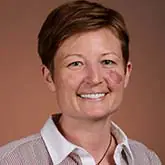
One of the most important awards an early-career scientist can receive is the NSF CAREER Award. Arianne Cease, assistant professor in the School of Sustainability and affiliated faculty in the School of Life Sciences, recently received the call telling her that she would be an NSF CAREER recipient for 2020. Besides being prestigious, the CAREER provides funding for five years, giving the principal investigator a solid foundation on which to build their research program.
Cease is the director of the Global Locust Initiative (GLI). Locusts are grasshoppers that migrate together to a new location to exploit fresh resources. A locust plague can devastate local agriculture and bring starvation to untold numbers of people. The GLI is focused on interdisciplinary locust research and management to reduce or eliminate the harm caused by these migrating insects.
Unlike many other funders, the National Science Foundation (NSF) supports fundamental research. So, Cease focused her application on how nutritional variation affects the migratory potential of locusts. By integrating international educational opportunities with interdisciplinary lab and field research, Cease will test how nutrition, population density and habitat variability interact to affect the relative investment in migration, immune function, and reproduction in locusts. The results will be translated into sustainable management and policy recommendations and disseminated to partners around the world to improve livelihoods and human and environmental health.
The NSF CAREER is notoriously difficult to get, and the third time was a charm for Cease. Applications are due each year in July. Applicants can submit only one proposal a year, but may apply up to three times before they reach their tenure review year. Across all the NSF panels, only about 500 awards are given, a success rate of 15-20%. Most awards are given to second or third submissions. If you are junior faculty and are interested in learning more about the NSF CAREER award, see NSF 20-525, and please contact Ann Marie Hess, Capture Manager, Global Futures Laboratory, Research Development Office (GFL RDO), annmarie.hess@asu.edu.